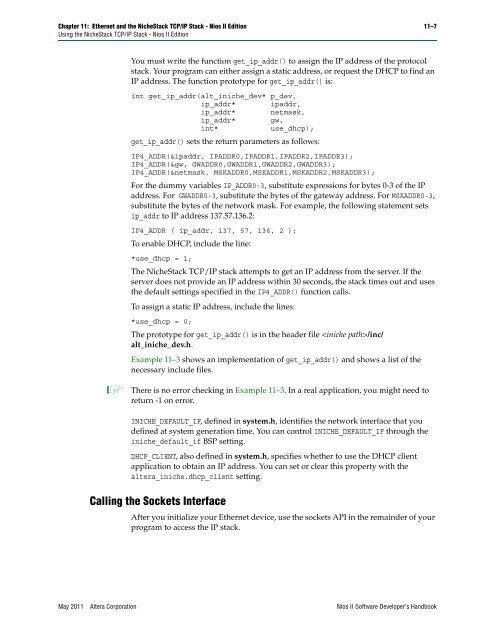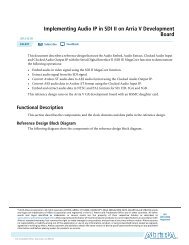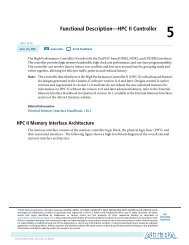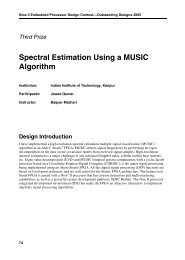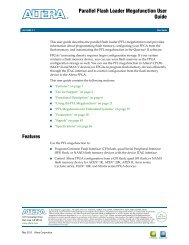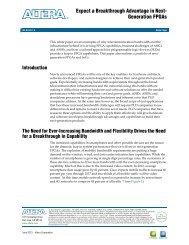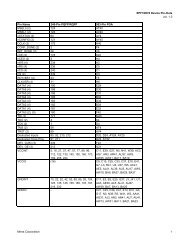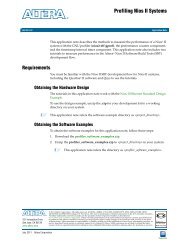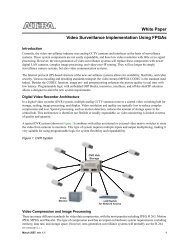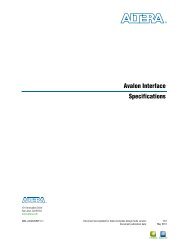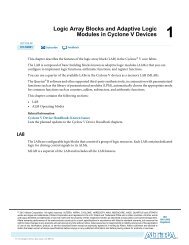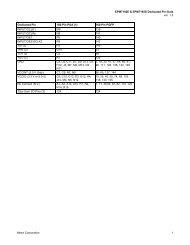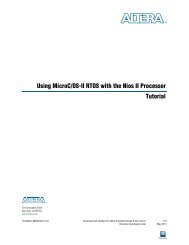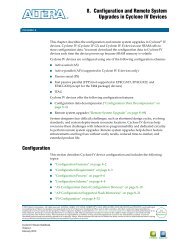Ethernet and the NicheStack TCP/IP Stack - Nios II Edition ... - Altera
Ethernet and the NicheStack TCP/IP Stack - Nios II Edition ... - Altera
Ethernet and the NicheStack TCP/IP Stack - Nios II Edition ... - Altera
You also want an ePaper? Increase the reach of your titles
YUMPU automatically turns print PDFs into web optimized ePapers that Google loves.
Chapter 11: <strong>E<strong>the</strong>rnet</strong> <strong>and</strong> <strong>the</strong> <strong>Niche<strong>Stack</strong></strong> <strong>TCP</strong>/<strong>IP</strong> <strong>Stack</strong> - <strong>Nios</strong> <strong>II</strong> <strong>Edition</strong> 11–7<br />
Using <strong>the</strong> <strong>Niche<strong>Stack</strong></strong> <strong>TCP</strong>/<strong>IP</strong> <strong>Stack</strong> - <strong>Nios</strong> <strong>II</strong> <strong>Edition</strong><br />
You must write <strong>the</strong> function get_ip_addr() to assign <strong>the</strong> <strong>IP</strong> address of <strong>the</strong> protocol<br />
stack. Your program can ei<strong>the</strong>r assign a static address, or request <strong>the</strong> DHCP to find an<br />
<strong>IP</strong> address. The function prototype for get_ip_addr() is:<br />
int get_ip_addr(alt_iniche_dev* p_dev,<br />
ip_addr* ipaddr,<br />
ip_addr* netmask,<br />
ip_addr* gw,<br />
int* use_dhcp);<br />
get_ip_addr() sets <strong>the</strong> return parameters as follows:<br />
<strong>IP</strong>4_ADDR(&ipaddr, <strong>IP</strong>ADDR0,<strong>IP</strong>ADDR1,<strong>IP</strong>ADDR2,<strong>IP</strong>ADDR3);<br />
<strong>IP</strong>4_ADDR(&gw, GWADDR0,GWADDR1,GWADDR2,GWADDR3);<br />
<strong>IP</strong>4_ADDR(&netmask, MSKADDR0,MSKADDR1,MSKADDR2,MSKADDR3);<br />
For <strong>the</strong> dummy variables <strong>IP</strong>_ADDR0-3, substitute expressions for bytes 0-3 of <strong>the</strong> <strong>IP</strong><br />
address. For GWADDR0-3, substitute <strong>the</strong> bytes of <strong>the</strong> gateway address. For MSKADDR0-3,<br />
substitute <strong>the</strong> bytes of <strong>the</strong> network mask. For example, <strong>the</strong> following statement sets<br />
ip_addr to <strong>IP</strong> address 137.57.136.2:<br />
<strong>IP</strong>4_ADDR ( ip_addr, 137, 57, 136, 2 );<br />
To enable DHCP, include <strong>the</strong> line:<br />
*use_dhcp = 1;<br />
The <strong>Niche<strong>Stack</strong></strong> <strong>TCP</strong>/<strong>IP</strong> stack attempts to get an <strong>IP</strong> address from <strong>the</strong> server. If <strong>the</strong><br />
server does not provide an <strong>IP</strong> address within 30 seconds, <strong>the</strong> stack times out <strong>and</strong> uses<br />
<strong>the</strong> default settings specified in <strong>the</strong> <strong>IP</strong>4_ADDR() function calls.<br />
To assign a static <strong>IP</strong> address, include <strong>the</strong> lines:<br />
*use_dhcp = 0;<br />
The prototype for get_ip_addr() is in <strong>the</strong> header file /inc/<br />
alt_iniche_dev.h.<br />
Example 11–3 shows an implementation of get_ip_addr() <strong>and</strong> shows a list of <strong>the</strong><br />
necessary include files.<br />
1 There is no error checking in Example 11–3. In a real application, you might need to<br />
return -1 on error.<br />
INICHE_DEFAULT_IF, defined in system.h, identifies <strong>the</strong> network interface that you<br />
defined at system generation time. You can control INICHE_DEFAULT_IF through <strong>the</strong><br />
iniche_default_if BSP setting.<br />
DHCP_CLIENT, also defined in system.h, specifies whe<strong>the</strong>r to use <strong>the</strong> DHCP client<br />
application to obtain an <strong>IP</strong> address. You can set or clear this property with <strong>the</strong><br />
altera_iniche.dhcp_client setting.<br />
Calling <strong>the</strong> Sockets Interface<br />
After you initialize your <strong>E<strong>the</strong>rnet</strong> device, use <strong>the</strong> sockets API in <strong>the</strong> remainder of your<br />
program to access <strong>the</strong> <strong>IP</strong> stack.<br />
May 2011 <strong>Altera</strong> Corporation <strong>Nios</strong> <strong>II</strong> Software Developer’s H<strong>and</strong>book


